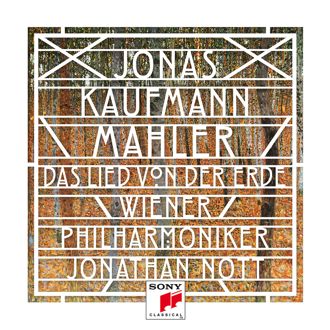|
|
|
|
|
|
|
|
|
Presto News, 7 April 2017
|
|
|
|
|
Jonas Kaufmann takes on Das Lied von der Erde - all of it! |
|
 The
star tenors on Sony’s books certainly like their controversial excursions
into baritone territory: first it was Plácido Domingo (who recorded a disc
of Verdi baritone arias for the composer's bicentenary in 2013), and now
Jonas Kaufmann's decided to tackle Mahler's Das Lied von der Erde (scored
for contralto/baritone and tenor soloists) single-handed. When I first
received the sales-notes for this release I assumed they’d left off one of
the singers, but he really is performing all six songs (and in the original
keys). Is it perfect? No. Is it worth hearing? A resounding ‘Yes’ from me. The
star tenors on Sony’s books certainly like their controversial excursions
into baritone territory: first it was Plácido Domingo (who recorded a disc
of Verdi baritone arias for the composer's bicentenary in 2013), and now
Jonas Kaufmann's decided to tackle Mahler's Das Lied von der Erde (scored
for contralto/baritone and tenor soloists) single-handed. When I first
received the sales-notes for this release I assumed they’d left off one of
the singers, but he really is performing all six songs (and in the original
keys). Is it perfect? No. Is it worth hearing? A resounding ‘Yes’ from me.
This is the first Mahler the German tenor’s committed to disc, though
he’s been performing the major song-cycles in recital for some years now.
It’s a bold move - but if anyone’s got the goods to take on the entire work
it’s Kaufmann, with his solid two-and-a-half octave range and dusky,
resonant middle and lower registers.
Now, not everything here is
going to please everyone. If, like me, you fell in love with Das Lied
through Klemperer’s legendary recording with Fritz Wunderlich in the tenor
role, you might bridle initially at the opening song in which Kaufmann
sounds pushed to his limits by the high tessitura - but this is a singer who
often thrills most when he’s right on the edge, and to me the tangible sense
of struggle here’s entirely in keeping with the febrile intensity of the
text.
Perhaps surprisingly, it’s actually the songs usually assigned
to the contralto/baritone that come off best. Kaufmann may be breaking new
ground in taking on both ‘roles’, but he’s not the first dark-hued ‘high’
voice to essay songs 2, 4 and 6: Jessye Norman, essentially a dramatic
soprano despite occasional excursions into lower-lying territory, recorded
the contralto songs for both James Levine and Colin Davis. And thinking back
through my own little library of recordings, it occurred to me that a lot of
the female singers I love in these songs are dramatic mezzos whose voices
actually sit very similarly to Kaufmann’s (though obviously an octave up!) -
Christa Ludwig, for instance, who frequently sang roles like Ortrud, Lady
Macbeth, and Leonore in Fidelio which require solid top Bs and even Cs as
well as a sturdy middle register, much like the bulk of Kaufmann’s operatic
repertoire. There’s also a particular quirk of his vocal anatomy which plays
out quite beautifully in these ‘low’ songs: a distinct ‘tipping point’ in
the voice around the high E and F, which is more usually found in baritones
and mezzos, and which these songs (Der Abschied in particular) exploit for
emotional effect.
Once I’d got my initial inevitable ‘Can he?’s and
‘Should he?’s out of the way, though, vocal technicalities weren’t really at
the forefront of my mind: my overwhelming impression is of how well the
orchestration and the texts suit Kaufmann, who to my mind is always at his
considerable best when pouring out angry frustration at full throttle, or
ruminating on dark nights of the soul (he conveys the manic intoxication of
that opening song with the same nihilistic recklessness which makes the
Tannhäuser excerpt on his Wagner recital for Decca so devastating, and the
sublime closing pages of Der Abschied put me in mind of the still small
voice of resignation which he brings to the final songs of Winterreise). The
orchestral colours of the cycle (which somehow always strike me as
prevailingly autumnal, even in the evocations of spring) also work
beautifully against his distinctive dark grainy sound, with the prominent
cor anglais part providing an especially apposite foil (the woodwind section
of the Wiener Philharmoniker under Jonathan Nott are wonderfully idiomatic
throughout). After the Verdi, Puccini, and German and Italian ‘pops’ discs,
it’s marvellous to have Kaufmann back on home territory, digging into texts
in his native language and exuding Weltschmerz and Sehnsucht once more.
|
|
|
|
|
|
|
|
|
|
|
|
|
|
|
|
|
|
|